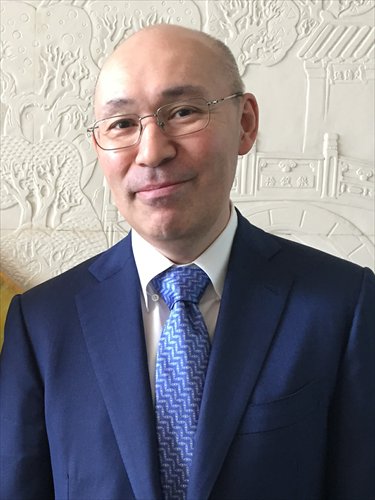Astana warmly embraces One Belt, One Road

Kairat Kelimbetov Photo: Sun Xiaobo/GT
Editor's Note:
Kazakhstan, an important part of China's "One Belt, One Road" initiative, has expansive economic cooperation with China in areas like energy, minerals and infrastructure. Meanwhile, Kazakhstan is endeavouring to develop its financial sector and its Astana International Financial Center (AIFC) is seeking to link up with major international financial centers. What are the areas yet to be tapped in China-Kazakhstan cooperation? What incentives will Kazakhstan provide to attract international investors? Global Times (GT) reporter Sun Xiaobo talked with Kairat Kelimbetov (Kelimbetov), governor of the AIFC, over these issues.
GT: China is Kazakhstan's second largest trading partner and largest export market. What do you think of the status quo and prospects of China-Kazakhstan cooperation? Is there any potential yet to be tapped by the two countries?
Kelimbetov: Politically, Kazakhstan is a reliable and strong partner of China in the region. We have full and common understanding of global problems and long strategic cooperation. In the future, it's important that we don't have any problems but have strong visions on how to develop our relationship. Our relationship will go stronger.
Kazakhstan produces 1.6 million barrels of oil a day and will double this in 10 to 15 years. One of the key partners in oil production will be Chinese companies.
The overall situation with the oil price won't damage the strong cooperation between China and Kazakhstan. Chinese companies will play a significant role in investing in this area since they have already run good projects in petrochemical, gas and oil refinery.
The two sides will cooperate in agriculture, food processing, industrial development and mining as Kazakhstan is an exporter of green food, and our agricultural products are natural and not genetically modified.
Kazakhstan is also the biggest supplier of uranium to China as it has ambitious plans to build hundreds of new nuclear power plants and this can make strong bilateral cooperation in this area.
Kazakhstan is a good tourism and investment destination for China. The Chinese middle class is expected to grow to 300 million, who prefer to travel overseas. At the Astana Expo 2017, we expect 5 million tourists from all over the world, mostly from China.
Education is also a good area for cooperation. Moreover, as China is leading in new technologies with the exciting development of Alibaba, Xiaomi and Huawei, the two sides can promote this cooperation in Central Asia and Kazakhstan could be a good platform for these companies to expand.
We have to figure out how to build joint ventures to develop our cooperation.
GT: The AIFC plans to link up with major international counterparts and promote Astana as a leading place to do business. What's your expectation for China in this regard? Will there be incentives to attract more Chinese investors to Kazakhstan?
Kelimbetov: In 2013, Chinese President Xi Jinping announced the "One Belt, One Road" initiative, which is very much in line with the Kazakh government. The two sides have built the strategic relationship and over the past three years they have signed agreements at political, economic and business levels. The total worth of agreements is about $50 billion.
Building the AIFC is very similar to what was done in the past 50 years in Hong Kong and Singapore and we've seen how the Chinese government supports the development of the Shanghai financial center.
We want to develop good conditions for investors by establishing clear and transparent rules, implementing English-language law and building an independent financial court to resolve investment disputes, where the working language will be English.
The special advantages to be offered include tax exemption for 50 years, simplified visa for the AIFC participants and also partnering with privatization program in Kazakhstan in different areas. These create good opportunities for Chinese businesses to invest in not only Kazakhstan but other Central Asian countries through the AIFC.
As Kazakhstan is also part of the Eurasian Economic Union, it's very convenient for Chinese companies to enter the Eurasian economic community through Kazakhstan.
Besides, the AIFC works with a number of Chinese financial institutions such as the Citic Corporation, big data centers in Kazakhstan and the Silk Road Fund that finances infrastructure projects in Central Asia. We'd also like to discuss cooperation with Shanghai and Hong Kong stock exchanges. I hope these can help strengthen cooperation between China and Kazakhstan.
GT: How can the Asian Infrastructure Investment Bank (AIIB) promote Kazakhstan's development?
Kelimbetov: The AIIB is a multinational institution with serious stakeholders and is similar to international organizations of the past 50 years like the World Bank and Asian Development Bank. But the AIIB has a specific mission: to foster the development of infrastructure and cooperation between Asian countries.
The AIIB will play a significant role in the "Belt and Road" initiative and that the bank will be very active in Central Asia.
GT: Some Western observers have lots of questions about the "One Belt, One Road" initiative and the AIIB, and consider the two as China's attempts to challenge the Western system. What's your take on this?
Kelimbetov: The world is changing now such as in commodities and new technologies. Sometimes there is competition in a particular market, but from the other side there are different markets that bring more cooperation. The rest of the world like the Eurasian economic space, Central Asia, East Asia and Southeast Asia need trillions of dollars of investment in the future.
The gravity of economic activity is moving to Asia where there are emerging markets like China and India. There is space for anyone who wants to work, but governments have to develop infrastructure.
The role of the AIIB and the "Belt and Road" initiative is very crucial because they connect countries and people in the region.
We should move from the old perception of economic and geopolitical competition and realize that there are more opportunities for cooperation including that between Western and Eastern nations.